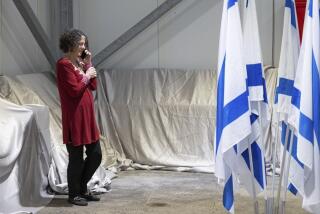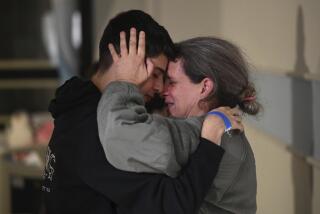Many Hostages in Iraq Are Sick, Freed Britons Report
- Share via
LONDON — Many hostages in Iraq are sick and several rioted to protest the conditions, Britons returning home from Iraq said today. One diabetic said he was denied insulin.
“We were in really bad shape,” Jim Thompson, one of 32 Britons freed Tuesday, told reporters on the flight home from Iraq.
Thompson, 50, an engineering company manager, said he was among 15 foreigners held as human shields at an Iraqi armaments factory.
“We told the guards, unless you do something . . . we are going to have a disturbance,” Thompson was quoted as saying.
He said when nothing was done, they tore down fences, broke windows, daubed remarks critical of President Saddam Hussein on walls and shouted anti-Hussein slogans until guards forced them back into their rooms at gunpoint.
He did not say where the factory was located or when the incident happened.
Others told of being moved from site to site as part of Iraq’s human shield policy.
Syd McCann, 52, said after Iraqi troops stopped him from escaping across the Syrian border, he was held at two strategic locations outside Baghdad.
One was a factory making machine parts. The other was a factory that he believed was making explosives or chemicals.
“They tended to drive us backwards and forwards,” he said.
London sales executive John York, a diabetic, told the British Broadcasting Corp. in a radio interview:
“The Iraqi authorities would not give me the insulin. I have since found out . . . that there is plenty of insulin available in Iraq.”
Doctors on the flight said the sick included people suffering from a variety of illnesses including cancer, heart trouble, diabetes, liver complaints, punctured eardrums, epilepsy and stress.
Dr. Ronald Eccles, 42, who was detained in Iraq while on a physiology lecture tour, warned of health problems among those still trapped in Iraq.
“There are a lot of stress-related diseases coming out,” said Eccles, who suffers from severe arthritis. “People have been developing heart trouble and diabetes. If they had any medical problems in the past, they are flaring up and are made much worse by the ordeal.”
“Everybody was getting upset. You start to get angry, but you don’t know where to direct it. It’s a bit dangerous to start taking it out against the Iraqi soldiers,” he said.
The 32 Britons were released Tuesday after the intervention of former Prime Minister Edward Heath. They arrived in London today.
More to Read
Sign up for Essential California
The most important California stories and recommendations in your inbox every morning.
You may occasionally receive promotional content from the Los Angeles Times.










